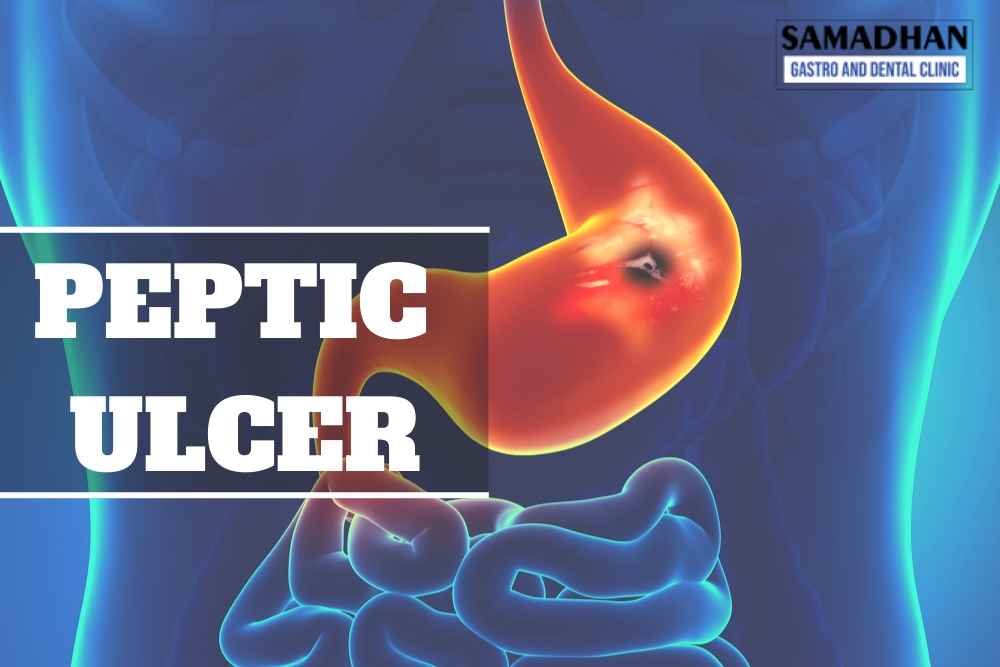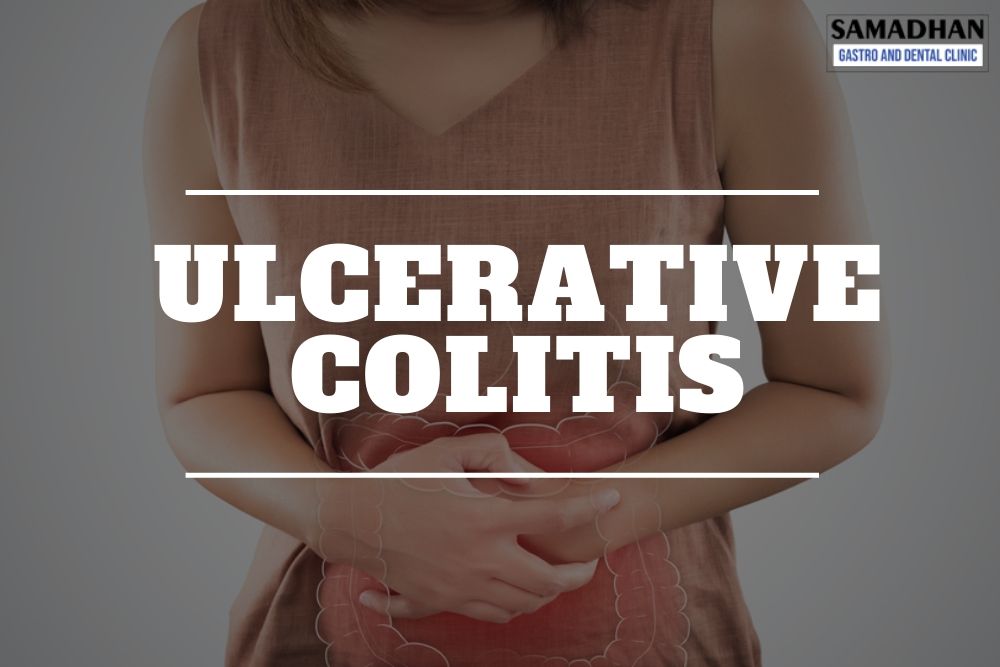Peptic Ulcer: Causes, Symptoms, Treatment

What is Peptic Ulcer?
Peptic Ulcer is an open sore or a break with a burning sensation. It develops on the inner lining of the stomach or upper portions of the small intestine. These are serious lesions of the stomach or intestines.Classification of Peptic Ulcer:
Gastric Ulcer : Occurs in the inner wall of the stomach.
Duodenal Ulcer : Occurs inside duodenum which is the first part of the small intestine.
About 10% of the population suffers from Peptic Ulcer Disease (PUD).
Symptoms of Peptic Ulcer
The most common symptom of Peptic Ulcer Disease is burning pain in the abdomen that extends from the belly button to the chest bone. The pain can be mild in the case of small peptic ulcers. But, at times, it can be severe and intolerable leading to sleepless nights.Commonly encountered signs of PUD are listed:
Epigastric Pain : It is the pain that evolves in the upper abdomen region of the body. The epigastric region is an area where the abdominal muscle and the diaphragm produce an outward bulging of the abdominal wall.
Belching : Commonly known as burping is the release of gas from the upper digestive tract i.e. stomach through the mouth. Feeling of fullness or bloating occurs.
Fatty food intolerance
Poor Appetite
Unexplained weight loss
Nausea
Vomiting
Bloody or dark stools
Causes of Peptic Ulcer
Going straight to the source, there are multiple factors responsible for the breakdown of the inner stomach lining or duodenum. These include:
Helicobacter Pylori (H.pylori) : It is a kind of bacterial infection that causes stomach pain and inflammation.
Non Steroidal Anti-inflammatory Drugs (NSAIDs) : A category of drugs for pain relief, blood clot prevention, and fever reduction. Regular intake of these can lead to gastrointestinal ulcers and bleeds.
Tobacco Smoking.
Crohn's Disease : It is an Inflammatory Bowel Disease (IBD) that affects any portion of the gastrointestinal tract that starts from mouth to anus. Symptoms consist of abdominal pain, diarrhea, fever, and weight loss.
Excess consumption of spicy food.
Peptic Ulcer Disease Treatment
Every problem has an existing solution. The team of experts at Samadhaan Clinic performs some diagnostic tests to find the cause of the ulcer. Treatment of peptic ulcers is often successful which leads to healing.
What Are The Peptic Ulcer Risk Factors?
Certain factors may increase the risk of developing peptic ulcers. These includes:
- Helicobacter Pylori Infection: This bacterial infection is a significant risk factor for peptic ulcers. It weakens the protective mucous lining of the stomach and duodenum.
- Regular Use of NSAIDs: Nonsteroidal anti-inflammatory drugs (NSAIDs) like aspirin and ibuprofen can irritate the stomach lining, leading to peptic ulcers.
- Smoking: Tobacco smoking increases the risk of peptic ulcers and can hinder the healing process
- Excessive Alcohol Consumption: Heavy alcohol intake can contribute to the development and worsening of peptic ulcers.
- Radiation Therapy: People undergoing radiation treatment, especially in the abdominal area, may be at an increased risk of developing peptic ulcers.
Some Peptic Ulcer Complications
Peptic ulcers complication can be serious and may include:
- Internal Bleeding: Peptic ulcers can cause bleeding, leading to symptoms such as bloody or dark stools and, in severe cases, anemia.
- Perforation: In some instances, ulcers can create a hole in the stomach or duodenal wall, causing contents to leak into the abdominal cavity, leading to a life-threatening condition.
- Obstruction: Swelling and scarring from long-term ulceration may obstruct the digestive tract, causing vomiting and weight loss.
Note- If you are suffering with any of these complications, consult the certified expert at Samadhan Clinic.
How You Can Prevent Peptic Ulcer?
While not all peptic ulcers can be prevented, certain lifestyle and dietary measures can help reduce the risk:
- Helicobacter Pylori Testing: Early detection and treatment of H. pylori infection can prevent ulcers.
- Limit NSAID Use: If possible, limit the use of NSAIDs, and consult with a healthcare professional about alternative pain management strategies.
- Moderate Alcohol Consumption: Limiting alcohol intake can contribute to overall stomach health.
- Quit Smoking: Smoking cessation not only reduces the risk of peptic ulcers but also promotes overall well-being.
- Healthy Diet: Adopting a diet rich in fruits, vegetables, and whole grains can support digestive health.
Peptic Ulcer Treatment Options
There are various options to treat peptic ulcer, some of the crucial treatment options are:-
- Antibiotics: When H. pylori infection is present, a course of antibiotics is often prescribed.
- Proton Pump Inhibitors (PPIs): These medications reduce stomach acid production, promoting ulcer healing
- H2 Blockers: Another class of acid-reducing medications that can aid in ulcer treatment.
- Antacids: These provide quick relief by neutralizing stomach acid.
- Cytoprotective Agents: Medications that protect the stomach lining, supporting healing.
Medications can include:
Antibiotic medications to kill H.pylori : This bacterium is found in the digestive tract. Several antibiotics are recommended by the doctor for a while. Additional medication is given to reduce stomach acid, including proton pump inhibitors.
Medicines that reduce acid production : These are acid blockers to reduce the amount of stomach acid released in the digestive tract that relieves ulcer pain and encourages healing.
Antacids to neutralize stomach acid :
Antacids neutralize stomach acid and relieve pain. However, they do not aid in ulcer healing.
Medicines that protect the inner lining of the stomach and small intestine : In some cases, medicines called cytoprotective agents are prescribed by the doctor to help protect the tissues that line the stomach and intestine.
Frequently Asked Question
Q. What is a peptic ulcer?
A peptic ulcer is an open sore developing on the inner lining of the stomach or upper part of the small intestine, causing a burning sensation.
Q. How are peptic ulcers classified?
Peptic ulcers are classified into Gastric Ulcers, occurring in the stomach's inner wall, and Duodenal Ulcers, developing inside the duodenum, the first part of the small intestine.
Q. What percentage of the population suffers from Peptic Ulcer Disease (PUD)?
Approximately 10% of the population is affected by Peptic Ulcer Disease.
Q. What are the common symptoms of Peptic Ulcer Disease?
The most common symptom is a burning pain in the abdomen, extending from the belly button to the chest bone. Other signs include epigastric pain, belching, fatty food intolerance, poor appetite, unexplained weight loss, nausea, vomiting, and bloody or dark stools.
Q. What causes epigastric pain in Peptic Ulcer Disease?
Epigastric pain evolves in the upper abdomen region, where the abdominal muscle and diaphragm produce an outward bulging of the abdominal wall.
Q. Is belching a common symptom of Peptic Ulcer Disease?
Yes, belching, the release of gas from the stomach through the mouth, is a common symptom, often accompanied by a feeling of fullness or bloating.
Q. What are the causes of Peptic Ulcer?
The Peptic ulcer causes include Helicobacter Pylori (H. pylori) bacterial infection, NSAIDs usage, tobacco smoking, Crohn's Disease, and excess consumption of spicy food.
Q. How is Helicobacter Pylori (H. pylori) infection treated in Peptic Ulcer Disease?
Antibiotic medications are prescribed to kill H. pylori, along with additional medication to reduce stomach acid.
Q. Do NSAIDs contribute to Peptic Ulcer development?
Yes, regular intake of Non-Steroidal Anti-inflammatory Drugs (NSAIDs) for pain relief can lead to gastrointestinal ulcers and bleeds.
Q. Can antacids aid in the healing of Peptic Ulcers?
Antacids neutralize stomach acid and provide relief from pain, although they do not directly contribute to the healing of ulcers.

